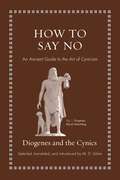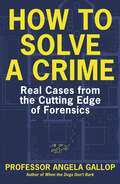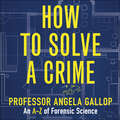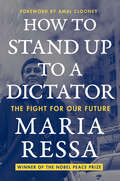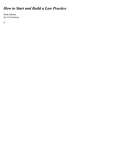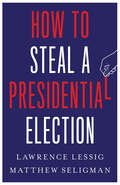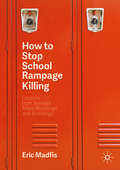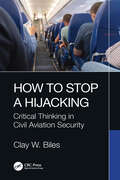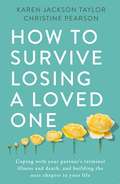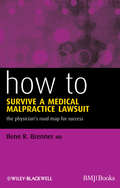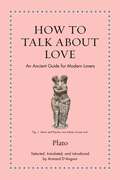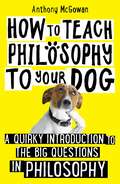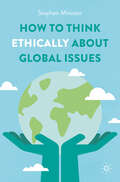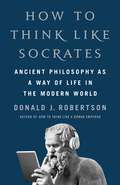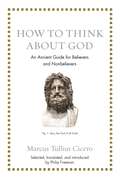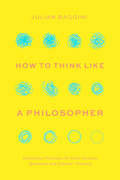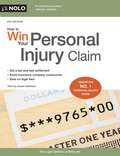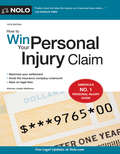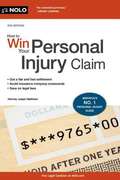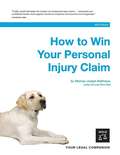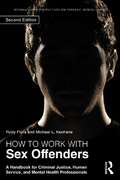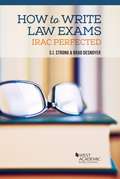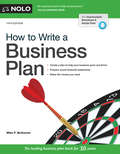- Table View
- List View
How to Say No: An Ancient Guide to the Art of Cynicism (Ancient Wisdom for Modern Readers)
by DiogenesAn entertaining and enlightening collection of ancient writings about the philosophers who advocated simple living and rejected unthinking conformityThe Cynics were ancient Greek philosophers who stood athwart the flood of society’s material excess, unexamined conventions, and even norms of politeness and thundered “No!” Diogenes, the most famous Cynic, wasn’t shy about literally extending his middle finger to the world, expressing mock surprise that “most people go crazy over a finger.” When asked why he was called Diogenes the Dog, he replied “because I fawn on those who give, I bark at those who don’t, and I bite scoundrels.” How to Say No is a delightful collection of brief ancient writings about Cynicism that captures all the outrageousness, wit, and wisdom of its remarkable cast of characters—from Diogenes in the fourth century BCE to the column-stander Symeon Stylites in late antiquity.With their “less is more” approach to life, the Cynics speak urgently to our world of climate change, economic uncertainty, and psychic malaise. Although the Cynics weren’t writers, their memorable utterances and behavior were recorded by their admirers and detractors, and M. D. Usher offers fresh new translations of appealing selections from this body of writing—ranging from street sermons and repartee to biography and snapshots of Cynics in action.Complete with introductions to the volume and each selection as well as the original Greek and Latin on facing pages, this lively book demonstrates why the Cynics still retain their power to surprise us and make us laugh—and to make us think and question how we live.
How to Solve a Crime: Stories from the Cutting Edge of Forensics
by Professor Angela GallopOut now: The gripping new book by the UK's most eminent forensic scientists, Angela Gallop__________CRIME [Noun]: An action or omission which constitutes an offence and is punishable by lawForensic science is one of the most important aspects of any criminal investigation.The impartial and objective evidence it provides can help convict the innocent and incarcerate the guilty. It enables courts to have the confidence in their decisions and to ensure that justice is done. Professor Angela Gallop has been at the forefront of forensics for more than 45 years. During her remarkable career, she has established and run forensic science laboratories and has worked on thousands of cases in the UK and across the world. In How to Solve a Crime, she describes some of her own and her colleagues most intriguing cases and the wide range of skills and techniques used to solve them. Whether it's looking at blood patterns and footwear marks at crime scenes to work out what happened, extracting data from suspects mobile phones to discover where they were at critical times, or analysing fragments of textiles fibers, glass or paint to determine where they might have come from, Gallop shows that every contact really does leave a trace and every trace can help to solve a crime. With unparalleled access and insight across a wide range of specialisms, How to Solve a Crime is a fascinating definitive and authoritative account of real-life forensic science. _________Praise for WHEN THE DOGS DON'T BARK'Fascinating' Guardian 'Offers a chilling glimpse into her life's work. . . fascinating stuff' Sunday Times 'Compelling' Daily Mirror 'A casebook that reads like The Encyclopaedia of Murder' Daily Express 'One of the professions leading lights' Woman & Home
How to Solve a Crime: Stories from the Cutting Edge of Forensics
by Professor Angela GallopPre-order now: The gripping new book by the UK's most eminent forensic scientists, Angela Gallop__________CRIME [Noun]: An action or omission which constitutes an offence and is punishable by lawForensic science is one of the most important aspects of any criminal investigation.The impartial and objective evidence it provides can help convict the innocent and incarcerate the guilty. It enables courts to have the confidence in their decisions and to ensure that justice is done. Professor Angela Gallop has been at the forefront of forensics for more than 45 years. During her remarkable career, she has established and run forensic science laboratories and has worked on thousands of cases in the UK and across the world. In How to Solve a Crime, she describes some of her own and her colleagues most intriguing cases and the wide range of skills and techniques used to solve them. Whether it's looking at blood patterns and footwear marks at crime scenes to work out what happened, extracting data from suspects mobile phones to discover where they were at critical times, or analysing fragments of textiles fibers, glass or paint to determine where they might have come from, Gallop shows that every contact really does leave a trace and every trace can help to solve a crime. With unparalleled access and insight across a wide range of specialisms, How to Solve a Crime is a fascinating definitive and authoritative account of real-life forensic science. _________Praise for WHEN THE DOGS DON'T BARK'Fascinating' Guardian 'Offers a chilling glimpse into her life's work. . . fascinating stuff' Sunday Times 'Compelling' Daily Mirror 'A casebook that reads like The Encyclopaedia of Murder' Daily Express 'One of the professions leading lights' Woman & Home
How to Solve a Crime: Stories from the Cutting Edge of Forensics
by Professor Angela Gallop'Endlessly fascinating...meticulously written and thoroughly absorbing book' Financial TimesOut now: The gripping new book by the UK's most eminent forensic scientists, Angela Gallop__________CRIME [Noun]: An action or omission which constitutes an offence and is punishable by lawForensic science is one of the most important aspects of any criminal investigation.The impartial and objective evidence it provides can help convict the guilty. It enables courts to have the confidence in their decisions and to ensure that justice is done. Professor Angela Gallop has been at the forefront of forensics for more than 45 years. During her remarkable career, she has established and run forensic science laboratories and has worked on thousands of cases in the UK and across the world. In How to Solve a Crime, she describes some of her own and her colleagues most intriguing cases and the wide range of skills and techniques used to solve them. Whether it's looking at blood patterns and footwear marks at crime scenes to work out what happened, extracting data from suspects mobile phones to discover where they were at critical times, or analysing fragments of textiles fibers, glass or paint to determine where they might have come from, Gallop shows that every contact really does leave a trace and every trace can help to solve a crime. With unparalleled access and insight across a wide range of specialisms, How to Solve a Crime is a fascinating definitive and authoritative account of real-life forensic science. _________Praise for WHEN THE DOGS DON'T BARK'Fascinating' Guardian 'Offers a chilling glimpse into her life's work. . . fascinating stuff' Sunday Times 'Compelling' Daily Mirror 'A casebook that reads like The Encyclopaedia of Murder' Daily Express 'One of the professions leading lights' Woman & Home
How to Stand Up to a Dictator: The Fight for Our Future
by Maria RessaIntroduction by Amal ClooneyFrom the recipient of the 2021 Nobel Peace Prize, an impassioned and inspiring memoir of a career spent holding power to account. Maria Ressa is one of the most renowned international journalists of our time. For decades, she challenged corruption and malfeasance in her native country, the Philippines, on its rocky path from an authoritarian state to a democracy. As a reporter from CNN, she transformed news coverage in her region, which led her in 2012 to create a new and innovative online news organization, Rappler. Harnessing the emerging power of social media, Rappler crowdsourced breaking news, found pivotal sources and tips, harnessed collective action for climate change, and helped increase voter knowledge and participation in elections. But by their fifth year of existence, Rappler had gone from being lauded for its ideas to being targeted by the new Philippine government, and made Ressa an enemy of her country’s most powerful man: President Duterte. Still, she did not let up, tracking government seeded disinformation networks which spread lies to its own citizens laced with anger and hate. Hounded by the state and its allies using the legal system to silence her, accused of numerous crimes, and charged with cyberlibel for which she was found guilty, Ressa faces years in prison and thousands in fines. There is another adversary Ressa is battling. How to Stand Up to a Dictator is also the story of how the creep towards authoritarianism, in the Phillipines and around the world, has been aided and abetted by the social media companies. Ressa exposes how they have allowed their platforms to spread a virus of lies that infect each of us, pitting us against one another, igniting, even creating, our fears, anger, and hate, and how this has accelerated the rise of authoritarians and dictators around the world. She maps a network of disinformation—a heinous web of cause and effect—that has netted the globe: from Duterte’s drug wars to America's Capitol Hill; Britain’s Brexit to Russian and Chinese cyber-warfare; Facebook and Silicon Valley to our own clicks and votes.Democracy is fragile. How to Stand Up to a Dictator is an urgent cry for Western readers to recognize and understand the dangers to our freedoms before it is too late. It is a book for anyone who might take democracy for granted, written by someone who never would. And in telling her dramatic and turbulent and courageous story, Ressa forces readers to ask themselves the same question she and her colleagues ask every day: What are you willing to sacrifice for the truth?
How to Startvand Build a Law Practice
by Jay FoonbergIf you have a question about starting and growing your own law practice, or improving your existing solo or small firm practice, Jay Foonberg has the answers in this power-packed, updated, and expanded new edition. <p><p>Learn it all from a practicing lawyer who provides you with real answers, for real practices, gained from real experiences. This classic ABA bestseller has been used by tens of thousands of lawyers as the comprehensive guide to planning, launching, and growing a successful practice. It’s packed with 769 pages of guidance on identifying the right location, finding clients, setting fees, managing your office, maintaining an ethical and responsible practice, maximizing available resources, upholding your standards, and much more. If you’re committed to starting your own practice, this book will give you the expert advice you need to make it succeed.<p><p>How the ABA’s #1 Bestseller Will Help YouThe book is organized into short, easy-to-read chapters and they deal with all the specific challenges you undoubtedly will encounter when you open your office. And the answers you’ll get are realistic, practical, and based on real-life experience. <p><p>Even if you already have an established practice, you are sure to find information that will help you compete and succeed. You’ll find a wealth of tips that can improve your practice once it is up and running, as well as dozens of time-saving templates and checklists. <p><p>In addition, there is all-new material for this edition, covering areas including: <ul><li>E-mail and the InternetLaw firm mergers and dissolutions</li> <li>Student loans</li> <li>Opportunities created by an aging population</li> <li>Nonlawyer consultants</li> <li>The globalization of legal practice, and much more! </li></ul> <p><p>This book is guaranteed to help you successfully launch your practice, run it at maximum efficiency, and avoid potential pitfalls along the way. You’ll get basic, practical advice given in Foonberg’s inimitable down-to-earth style–and answers to down-to-earth questions including: Where is the ideal place to open my office? How much cash do I need to start? How can I get cash up front to reduce bad debts?Should I charge for the first consultation? How do I spot the client who won’t pay? What kinds of equipment will I need–at a minimum–to start out?What are the most effective ways of getting clients?More than 100,000 lawyers have turned to Jay Foonberg for the secrets to running a successful law firm; now you can, too, with the acclaimed Sixth Edition.
How to Steal a Presidential Election
by Lawrence Lessig Matthew SeligmanFrom two distinguished experts on election law, an alarming look at how the American presidency could be stolen—by entirely legal means Even in the fast and loose world of the Trump White House, the idea that a couple thousand disorganized protestors storming the U.S. Capitol might actually prevent a presidential succession was farfetched. Yet perfectly legal ways of overturning election results actually do exist, and they would allow a political party to install its own candidate in place of the true winner. Lawrence Lessig and Matthew Seligman work through every option available for subverting a presumptively legitimate result—from vice-presidential intervention to election decertification and beyond. While many strategies would never pass constitutional muster, Lessig and Seligman explain how some might. They expose correctable weaknesses in the system, including one that could be corrected only by the Supreme Court. Any strategy aimed at hacking a presidential election is a threat to democracy. This book is a clarion call to shore up the insecure system for electing the president before American democracy is forever compromised.
How to Stop School Rampage Killing: Lessons from Averted Mass Shootings and Bombings
by Eric MadfisThis book tackles the important question of how we can understand and learn from the school rampage killings that have been prevented. In the flood of recent accounts and analyses of deadly school rampage killings that plague society and inspire widespread public fear, very little attention has been given to the incidents that almost were. Building on Madfis’ previous book, The Risk of School Rampage: Assessing and Preventing Threats of School Violence (2014), this vital work addresses key gaps in school violence scholarship through the examination of averted school rampage incidents in the United States and advances existing knowledge through ground-breaking insights from the latest research on mass murder, violence prevention, bystander intervention, disciplinary policy, and threat assessment in school contexts. This empirical study utilizes in-depth interviews conducted with school and police officials (administrators, counselors, security guards, police officers, and teachers) directly involved in averting potential school rampages to explore the processes by which threats are assessed and school rampage plots are thwarted. Madfis finds that many common contemporary school violence prevention policies and practices are ineffective at preventing rampage attacks and may actually increase the likelihood of their occurrence. Rather than uncritically adopting such problematic approaches, Madfis argues that schools must model prevention practices upon what has proven successful in averting potentially deadly incidents.
How to Stop a Hijacking: Critical Thinking in Civil Aviation Security
by Clay W. BilesHijackings and bombings have plagued civil aviation since 1930 and air rage incidents are on the rise. While there is aircraft and inflight training available for air marshals, other first responders receive minimal training on inflight security awareness and protocols. There are no other resources currently available to flight crews or armed first responders that specifically address inflight security and how to address threats of disturbances on airplanes.How to Stop a Hijacking provides readers with fundamental principles on how to think more critically about onboard security threats. The aircraft cabin poses unique environment and security challenges, and first responders can apply security awareness and critical thinking skills to establish a safer environment in the cabin and airport for everyone onboard. The lessons in this book are driven with the central objective of teaching the reader how to counter inflight aggression and maintain tactical control of the cabin. Written by a former federal air marshal instructor, this book looks at the recent rash of air rage incidents and violence on airplanes, in addition to the real and ever-present threat of hijack or potential explosive device.How to Stop a Hijacking is a practical guide that offers methodological and tactically proven strategies for stopping violent acts onboard an aircraft inflight.
How to Survive Losing a Loved One: A Practical Guide to Coping with Your Partner's Terminal Illness and Death, and Building the Next Chapter in Your Life
by Christine Pearson Karen Jackson TaylorA practical, empowering guide to navigating your partner's diagnosis of a terminal or life-limiting illness, or death. Receiving the news that your partner has a terminal or life-limiting illness, or has died unexpectedly, is among the worst experiences in life. At a time when you are least able to cope, you are faced with a multitude of difficult decisions, some of which must be made quickly. What you need is a friend who has experienced everything you are about to face, who can support you as you navigate some tough, important choices. This book is that friend. There is plenty of information out there but where to start looking? What information is needed and how can it be accessed? What decisions are essential in the immediate term and what can be left until later? Throughout the book, the emphasis is on protecting and supporting those left behind by presenting almost every choice you may need to make and the possible implications of each decision. You will learn:- The importance of creating a will, arranging power of attorney, organising advanced decisions of treatment, and even getting married or entering a civil partnership- What you are entitled to from the state, the NHS and your employer- How to stabilise your finances and prepare to run a household alone- Where your partner ought to be during treatment and/or palliative care, and how to go about achieving this- Which decisions need to be made after death, from planning the funeral to accessing your partner's estate- How to navigate the grieving process and take control of a happy future No matter where you are in the process, How to Survive Losing a Loved One is a comprehensive, practical and empowering guide to coping with your partner's terminal illness and death, and building the next chapter in your life.
How to Survive Losing a Loved One: A Practical Guide to Coping with Your Partner’s Terminal Illness and Death, and Building the Next Chapter in Your Life
by Christine Pearson Karen Jackson TaylorA practical, empowering guide to navigating your partner's diagnosis of a terminal or life-limiting illness, or death. Receiving the news that your partner has a terminal or life-limiting illness, or has died unexpectedly, is among the worst experiences in life. At a time when you are least able to cope, you are faced with a multitude of difficult decisions, some of which must be made quickly. What you need is a friend who has experienced everything you are about to face, who can support you as you navigate some tough, important choices. This book is that friend. There is plenty of information out there but where to start looking? What information is needed and how can it be accessed? What decisions are essential in the immediate term and what can be left until later? Throughout the book, the emphasis is on protecting and supporting those left behind by presenting almost every choice you may need to make and the possible implications of each decision. You will learn:- The importance of creating a will, arranging power of attorney, organising advanced decisions of treatment, and even getting married or entering a civil partnership- What you are entitled to from the state, the NHS and your employer- How to stabilise your finances and prepare to run a household alone- Where your partner ought to be during treatment and/or palliative care, and how to go about achieving this- Which decisions need to be made after death, from planning the funeral to accessing your partner's estate- How to navigate the grieving process and take control of a happy future No matter where you are in the process, How to Survive Losing a Loved One is a comprehensive, practical and empowering guide to coping with your partner's terminal illness and death, and building the next chapter in your life.
How to Survive a Medical Malpractice Lawsuit
by Ilene R. BrennerEveryone seeks to avoid getting into a lawsuit, but what do you do if this does happen?Getting sued for medical malpractice is one of the most traumatic events of a physician's career.This text will guide doctors and physicians through the process from the moment they receive a summons until the after-trial appeal process.Containing valuable information that physicians need to know to prevent making critical mistakes that can hurt their caseWith strategies explained to maximize their chances of a defendant's verdict.Including vital information on how to change your attorney, act at the deposition and dress for court,Navigating through what is a mysterious and terrifying process in non-legalese language that is easy to understand including what makes patients angry, strategies for coping, sample questions and tips on answering them to what happens in court and how to continue if there is a bad outcome.
How to Talk about Love: An Ancient Guide for Modern Lovers (Ancient Wisdom for Modern Readers)
by PlatoExplore the nature of love in this charming new translation of selections from Plato&’s great dramatic work, the SymposiumWhat is love? In poetry, songs, fiction, movies, psychology, and philosophy, love has been described, admired, lamented, and dissected in endless ways. Is love based on physical attraction? Does it bring out our better selves? How does it relate to sex? Is love divine? Plato&’s Symposium is one of the oldest, most influential, and most profound explorations of such questions—it is even the source of the idea of &“Platonic love.&” How to Talk about Love introduces and presents the key passages and central ideas of Plato&’s philosophical dialogue in a lively and highly readable new translation, which also features the original Greek on facing pages.The Symposium is set at a fictional drinking party during which prominent Athenians engage in a friendly competition by delivering improvised speeches in praise of Eros, the Greek god of love and sex. The aristocrat Phaedrus, the legal expert Pausanias, the physician Eryximachus, the comic playwright Aristophanes, and the tragic poet Agathon—each by turn celebrates different aspects of love before Socrates proposes not to praise love but to tell the truth about it. In the final speech, the politician and libertine Alcibiades argues that Socrates himself is the epitome of love.Deftly capturing the essence and spirit of Plato&’s masterpiece, How to Talk about Love makes the Symposium more accessible and enjoyable than ever before.
How to Teach Philosophy to Your Dog: A Quirky Introduction to the Big Questions in Philosophy
by Anthony McGowanMonty was just like any other dog. A scruffy and irascible Maltese terrier, he enjoyed barking at pugs and sniffing at trees. But after yet another dramatic confrontation with the local Rottweiler, Anthony McGowan realises it&’s high time he and Monty had a chat about what makes him a good or a bad dog. And they don&’t stop at ethics. Taking his cue from Monty&’s canine antics, McGowan leads us on an enlightening jaunt through the world of philosophy. Will Kant convince Monty to stop stealing cheesecake? How long will they put up with Socrates poking holes in every argument? Do they have free will to pursue answers to these questions? Join the dutiful duo as they set out to uncover who – if anyone – has the right end of the ethical stick and can tell us how best to live one&’s life. But there is also a shadow over their conversations. Monty is not well… And so towards the end the biggest questions raise their heads: is there a God? Does life have a meaning? By the time of their last walk together, Monty – and the reader – will find that they have not just solved a few philosophical puzzles, but absorbed much of the history of Western philosophy.
How to Think Ethically about Global Issues
by Stephen MinisterThis textbook is an introduction to thinking ethically about global issues. Unlike existing books in this area, this book is truly interdisciplinary and includes a range of voices from both the Global South and the Global North. Rather than simply applying Western theories to case studies, Prof. Stephen Minister shows readers how to consider context and complexity, while respecting the agency of people elsewhere. It weaves together the work of thinkers and writers from the Global South with philosophical work on global ethics, relevant scholarship from other academic fields, and stories from fieldwork studying global issues on four continents. The textbook explores a variety of topics, including: cultural difference, gender, population, poverty, natural disasters, and development. It then encourages students to build on these ideas and think more deeply about topics such as foreign aid, inequality, immigration, international trade, climate change, human rights, and war and terrorism. Because the book’s style is accessible and engaging, it will be an excellent text for ethics and global studies courses, as well as being of interest to general readers who want to think better about global issues.
How to Think Like Socrates: Ancient Philosophy as a Way of Life in the Modern World
by Donald J. RobertsonHow can we apply the teachings of the greatest ancient philosopher to modern life?Socrates is the quintessential Athenian philosopher, the source of the entire Western philosophical tradition, and Godfather to the Stoics. He spent his life teaching practical philosophy to ordinary people in the streets of Athens, yet few people today are familiar with the wisdom he has to offer us.How to Think Like Socrates is an accessible and informative guide to the life of one of the greatest thinkers in history, and the first book to focus on applying his ideas to our daily lives. Author Donald J. Robertson transports readers back to ancient Athens, expertly weaving together a page-turning account of a philosopher who eschewed material pleasures and stood by his beliefs, even in the face of controversy, with a steadfastness that ultimately resulted in his execution.How to Think Like Socrates highlights the continuing value of the Socratic Method to modern life. As a practicing cognitive-behavioral psychotherapist, Robertson also uses his expertise to reveal many parallels between the evidence-based concepts and techniques of modern psychology and the philosophy of Socrates, and shows how his philosophical insights can guide and benefit all of us to this day.
How to Think about God: An Ancient Guide for Believers and Nonbelievers (Ancient Wisdom for Modern Readers)
by Marcus CiceroA vivid and accessible new translation of Cicero’s influential writings on the Stoic idea of the divineMost ancient Romans were deeply religious and their world was overflowing with gods—from Jupiter, Minerva, and Mars to countless local divinities, household gods, and ancestral spirits. One of the most influential Roman perspectives on religion came from a nonreligious belief system that is finding new adherents even today: Stoicism. How did the Stoics think about religion? In How to Think about God, Philip Freeman presents vivid new translations of Cicero's On the Nature of the Gods and The Dream of Scipio. In these brief works, Cicero offers a Stoic view of belief, divinity, and human immortality, giving eloquent expression to the religious ideas of one of the most popular schools of Roman and Greek philosophy.On the Nature of the Gods and The Dream of Scipio are Cicero's best-known and most important writings on religion, and they have profoundly shaped Christian and non-Christian thought for more than two thousand years, influencing such luminaries as Augustine, Thomas Aquinas, Dante, and Thomas Jefferson. These works reveal many of the religious aspects of Stoicism, including an understanding of the universe as a materialistic yet continuous and living whole in which both the gods and a supreme God are essential elements.Featuring an introduction, suggestions for further reading, and the original Latin on facing pages, How to Think about God is a compelling guide to the Stoic view of the divine.
How to Think like a Philosopher: Twelve Key Principles for More Humane, Balanced, and Rational Thinking
by Julian BagginiAn invitation to the habits of good thinking from philosopher Julian Baggini. By now, it should be clear: in the face of disinformation and disaster, we cannot hot take, life hack, or meme our way to a better future. But how should we respond instead? In How to Think like a Philosopher, Julian Baggini turns to the study of reason itself for practical solutions to this question, inspired by our most eminent philosophers, past and present. Baggini offers twelve key principles for a more humane, balanced, and rational approach to thinking: pay attention; question everything (including your questions); watch your steps; follow the facts; watch your language; be eclectic; be a psychologist; know what matters; lose your ego; think for yourself, not by yourself; only connect; and don’t give up. Each chapter is chockful of real-world examples showing these principles at work—from the discovery of penicillin to the fight for trans rights—and how they lead to more thoughtful conclusions. More than a book of tips and tricks (or ways to be insufferably clever at parties), How to Think like a Philosopher is an invitation to develop the habits of good reasoning that our world desperately needs.
How to Win Your Personal Injury Claim
by Joseph MatthewsAfter your injury: Settle your claim the right way When you've been hurt in an accident, dealing with insurance companies and lawyers can feel exhausting. But armed with the right information, you can handle a claim yourself--and save many thousands of dollars in the process. How to Win Your Personal Injury Claim shows you how to handle almost any accident situation and guides you through the insurance claim process, step by step. Learn how to: protect your rights after an accident determine what your claim is worth deal with uncooperative doctors and insurance companies counter the special tactics insurance companies use prepare a claim for compensation negotiate a full and fair settlement stay on top of your case if you hire a lawyer This completely updated edition of How to Win Your Personal Injury Claim provides your state's most recent laws, including small claims court limits and lawsuit filing deadlines. a new chart explaining your state's in-car text and cell phone laws.
How to Win Your Personal Injury Claim
by Joseph MatthewsAfter your injury: Settle your claim the right way When you’ve been hurt in an accident, dealing with insurance companies and lawyers can feel exhausting. But armed with the right information, you can handle a claim yourself—and save many thousands of dollars in the process. How to Win Your Personal Injury Claim shows you how to handle almost any accident situation and guides you through the insurance claim process, step by step. Learn how to: protect your rights after an accident determine what your claim is worth deal with uncooperative doctors and insurance companies counter the special tactics insurance companies use prepare a claim for compensation negotiate a full and fair settlement stay on top of your case if you hire a lawyer This completely updated edition of How to Win Your Personal Injury Claim provides the latest state laws on small claims limits, no-fault car insurance, distracted driving, and lawsuit-filing deadlines.
How to Win Your Personal Injury Claim
by Joseph Matthews AttorneyKnow your rights! Find out how to make the best case for yourself and win your personal injury claim. Dealing with insurance companies and lawyers when filing a personal injury claim can feel like another accident is in the offing. But you can handle a claim yourself -- and save hundreds or thousands of dollars in the process. How to Win Your Personal Injury Claim shows you how to handle almost every accident situation, and guides you through the insurance claim process, step by step. Learn how to: - protect your rights after an accident - determine what your claim is worth - handle a property-damage claim - deal with uncooperative doctors, lawyers and insurance companies - counter the special tactics insurance companies use - prepare a claim for compensation - negotiate a full and fair settlement - stay on top of your case if you hire a lawyer This edition of How to Win Your Personal Injury Claim provides your state's most recent laws, small-claims court limits and Department of Insurance contact information. Plus, you'll find an all-new chart explaining your state's in-car text and cell phone laws.
How to Win Your Personal Injury Claim (6th edition)
The attorney author provides tips on both claims that consumers can handle themselves and those requiring working with a lawyer. Matthews discusses how fault is legally determined and covers all phases of the claim process. Helpful features include insurance contact information by state, sample documentation, and an accident claim worksheet. Annotation ©2004 Book News, Inc., Portland, OR (booknews.com)
How to Work with Sex Offenders: A Handbook for Criminal Justice, Human Service, and Mental Health Professionals (International Perspectives on Forensic Mental Health)
by Rudy Flora Michael L. KeohaneHow to Work with Sex Offenders is a cutting edge, state-of-the-art book that provides mental health professionals best practice techniques on how to clinically evaluate, interview, and treat this challenging patient population. Successful models of individual, family, and group models of psychotherapy are provided for the reader. In addition, this handbook walks the reader through the investigation, arrest, prosecution and court hearing process, from start to finish. Thoroughly revised, this new edition builds on additional research data and new information, adding advanced chapters on female offenders, Internet offenders, pornography, sexual addiction, rape and child and adolescent sexual misconduct. This is a must-read work for undergraduate and graduate students, law enforcement officers, prosecutors, judges, child protection service workers, therapists, and other professionals who work with sex offenders.
How to Write Law Exams: IRAC Perfected (Career Guides)
by S. I. Strong Brad DesnoyerWritten for every law student who ever wondered how to get better grades in law school, How to Write Law Exams: IRAC Perfected provides students of all levels with a detailed, comprehensive, and practical guide to success on law school exams. What’s more, How to Write Law Exams applies equally to all subject matters, making this text an ideal supplement for every law school course. <P><P>Focuses on law school and bar exams rather than the kind of assignments seen in legal writing class. As such, the book helps students improve their grades in all of their substantive courses, not just in their first year legal writing class. <P><P>Provides readers with a proven and easy-to-implement means of maximizing points on a law school exam. Rather than repeating vague generalities about grammar and style or providing simple bullet-point lists as other writing guides do, this text breaks the well-known IRAC method of legal writing into comprehensible segments and gives students the tools needed to master their law exams. <P><P>Provides readers with detailed student-written examples of the IRAC method in action. Annotated with line-by-line critiques, these sample essays show readers exactly what can go wrong in a law school exam and how to fix those problems before they appear on a graded paper. <P><P>Combining in-depth analysis, easy-to-understand writing, and innovative design features, How to Write Law Exams: IRAC Perfected is the answer to every law student’s exam questions.
How to Write a Business Plan
by Mike P. McKeeverStep-by-step advice on preparing a business plan You need a sound business plan to start a business or raise money to expand an existing one. For over 30 years, How to Write a Business Plan has helped fledgling entrepreneurs—from small service businesses and retailers to large manufacturing firms—write winning plans and get needed financing. This bestselling book contains clear step-by-step instructions and forms to put together a convincing business plan with realistic financial projections, effective marketing strategies, and overall business goals. You’ll learn how to: figure out if your business idea will make money determine and forecast cash flow create profit and loss forecasts prepare marketing and personnel plans find potential sources of financing, and present your well-organized plan to lenders and other backers. This edition is updated to reflect best practices for raising money (from SBA loans to equity crowdfunding).
